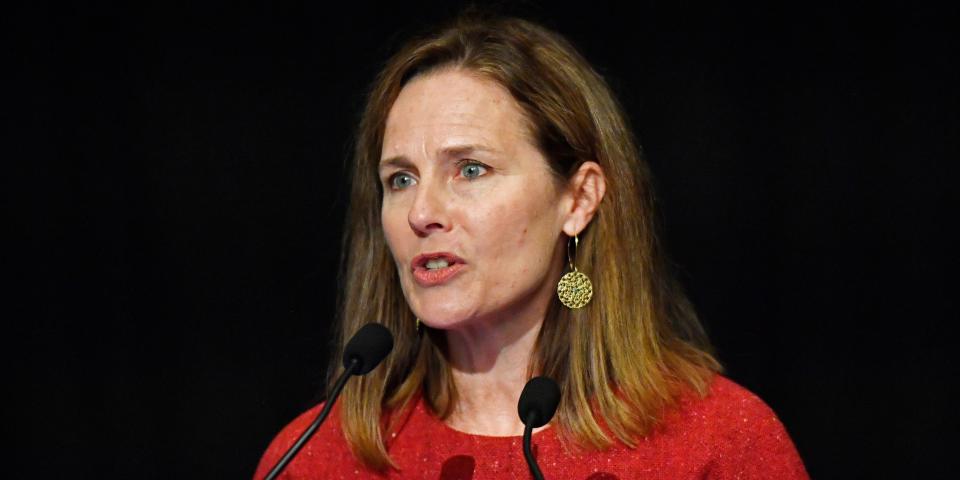Justices Amy Coney Barrett and Stephen Breyer want to convince you that the Supreme Court isn't political, but experts say 'it's naive to think people will' believe them

Justices Amy Coney Barrett and Stephen Breyer have tried to defend the Supreme Court's integrity.
"This court is not comprised of a bunch of partisan hacks," Barrett said at the McConnell Center this week.
Yet experts said they're ignoring the realities of how politics affects the court and its justices.
While critics blast the Supreme Court as hyperpartisan, Justice Amy Coney Barrett this week attempted to sway public perception, insisting the institution is independent from politics.
"My goal today is to convince you that this court is not comprised of a bunch of partisan hacks," she told attendees at the 30th anniversary of the University of Louisville's McConnell Center, a department founded by Senate Minority Leader Mitch McConnell, the Republican lawmaker who championed Barrett's nomination to the bench and introduced her at Sunday's event.
Barrett's colleague, Justice Stephen Breyer, likewise tried to protect the integrity of the Supreme Court this week.
"A lot of people will strongly disagree with many of the opinions or dissents that you write, but still, internally, you must feel that this is not a political institution," he told The Washington Post on Monday.
The "single most important point that I hope people will take" from my 27 years on the nation's high court "is judges are not junior league politicians," Breyer, 83, added.

"It's naive to think people will - it's hard to believe that you can convince people of that," William Lasser, a Clemson University professor focused on the politics of the Supreme Court, told Insider in response to the two justices' comments.
Though the conservative and liberal members of the court sought to defend their roles, they are ignoring what experts claim is the obvious: politics undeniably affects the Supreme Court and its justices.
"If the justices have to defend themselves from being partisan, that's already a problem in and of itself," Lasser added. "The court has always been a political institution for its history."
Public approval of the Supreme Court is at an all-time low
Justices have long tried to uphold confidence in the federal judiciary, often dismissing criticisms that its members are loyal to the Republican or Democratic presidents who appoint them. In one instance in 2018, Chief Justice John Roberts pushed back on then-President Donald Trump labeling a judge who ruled against his policy an "Obama judge."
"We do not have Obama judges or Trump judges, Bush judges or Clinton judges," Roberts said in a statement at the time. "What we have is an extraordinary group of dedicated judges doing their level best to do equal right to those appearing before them. That independent judiciary is something we should all be thankful for."
Despite their efforts, public approval of the US' highest court appears to be eroding. Just 37% of Americans - an all-time low - approve of the way Supreme Court is handling its job, according to a Quinnipiac University poll released on Wednesday. A Gallup poll conducted in July also found that public approval in the Supreme Court declined by 9 percentage points compared to the same month in 2020.

"Certainly, if you disagree with either of these justices, it's hard to look at Justice Barrett, as a Democrat, and say, 'I believe that she's not acting like a Republican,'" Lasser said. "It's hard to look at Breyer, if you're a Republican, and not see a Democrat."
Lasser took particular issue with Barrett's comment on Sunday that the justices' "judicial philosophies are not the same as political parties."

 Yahoo Autos
Yahoo Autos 